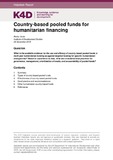Country-based Pooled Funds for Humanitarian Financing
Abstract
This rapid review provides a brief overview of the evidence on the effectiveness of CBPFs for humanitarian response, and recommendations of good practice. The review also highlights briefly findings on other types of country-based funds – funds that are accessible to multiple organisations, but with financing from only one donor (Thomas, 2017). The evidence found is from a mix of reports published by organisations (donors and NGOs) implementing or participating in CBPFs, and some (albeit) limited comparative analysis. The available evidence is overwhelmingly on UN CBPFs. It begins by presenting types of country-based pooled funds, of which The UN manages most CBPFs (with currently 18 UN CBPFs that received USD 832 million in 2017, and individual fund size from USD 7–140 million). It then moves to review the effectiveness of CBPFs. In overall, UN CBPFs are a valuable mechanism to enable response to local emergency needs which have been improving, however, allocative efficiencies (strategic coordination and ground-level decision-making) can be outstripped delays in approval process and heavy transaction costs – that are typically borne by the smallest NGOs. Although UN CBPFs have been criticised for being slow with cumbersome bureaucratic processes with high transaction costs for local organisations (Stoianova, 2014; Mowjee et al., 2016, Stoddard et al., 2017); there have been improvements over time but ultimately they remain constrained by inflexible UN Secretariat and UNDP administrative systems (MOPAN, 2017). It also reviews the CBPFs guideline on cross-cutting issues which cover gender mainstreaming and accountability to affected populations (MOPAN, 2017) but do not mention disability. Finally it presents the best practices for CBPFs which focus on prioritising needs through a strategic and multi-year approach, supporting national and local NGOs, drawing on existing expertise and experience, making CBPFs technically efficient, promoting a culture of risk management rather than risk avoidance, ensuring transparent and accessible information and tools, and including guidelines, support and monitoring for fund applicants to address 1) accountability to affected populations, 2) gender, 3) disability and 4) the impact of humanitarian action on the local environment within their work.
Citation
Carter, B. (2018). Country-based pooled funds for humanitarian financing. K4D Helpdesk Report. Brighton, UK: Institute of Development StudiesIs part of series
K4D Helpdesk Report;486Collections
- K4D [937]

